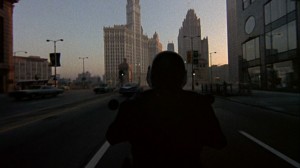
In 2011, the Wall Street thriller Margin Call came out of seemingly nowhere to provide the world with the dramatization of the ongoing financial crisis it didn’t know it wanted. It premiered at Sundance, and first-time writer/director J.C. Chandor got an Academy Award nomination for his screenplay. This time around, Chandor seems to have done a complete tonal about-face; where Margin Call was a talky, fast-paced movie with a game ensemble cast, his sophomore feature, All Is Lost, is nearly wordless, leisurely paced picture that has a total human cast of one.
That one person, only identified in the credits as Our Man (Robert Redford), is alone on a boat in the middle of the Indian Ocean. The first shot of him sees him being awakened by a stray shipping container full of tennis shoes piercing a hole in his boat’s hull. His electronic equipment (GPS, laptop, the whole nine) is damaged in the process. From this point on, Our Man’s course is clear: stay alive and afloat long enough to find a way to shore.
Our Man isn’t developed in the traditional sense; he has, as his credit suggests, no name, no concrete back story, and no apparent reason to be where he is. Everything we end up knowing about Our Man we have to glean from snap decisions and subtle gestures. So what do we end up knowing about him? Frankly, not a lot beyond the fact that he’s a skilled sailor. But what drives the film isn’t as much the character as it is the situation he’s in; death is just around the corner should any one thing go haywire. That’s what’s remarkable about All Is Lost, not its pared-down mise-en-scène, but how much narrative drive it creates and maintains within the parameters it sets within it. Every single action is of consequence; nothing is superfluous, everything is literally a matter of life or death.
But even economical narratives like this wouldn’t be worth anything if there wasn’t a great actor there to anchor them, and Robert Redford shoulders the burden of 100 minutes of solo acting like it was nothing. It’s a tour-de-force performance without any of the showiness that term implies. His portrayal of Our Man is assured and quietly intense, but more impressive is how successful he is in the role given its physicality. Redford, now 77, excels in an exerting role that septuagenarians don’t generally get offered. Better still, he’s written as a character who does everything right. In this respect, the movie is admirable because it doesn’t shortchange the audience in order to create tension. Our Man spends a good portion of the movie patching holes and tying knots, and not once does the movie cut back to a prior fix giving way. All Is Lost values both the intelligence if its protagonist and its audience.
This ultimately ties into what makes this such a tense, brilliant film; it posits that in any given situation, you can perform every task correctly and with exacting precision and still come up short; that someone’s tenacity and resourcefulness, however great, will eventually plateau. It’s tempting to view this as an aging/death metaphor (especially given the performer in question), but I feel like this movie is best viewed in an order vs. chaos kind of way, where Man quixotically tries to jury-rig himself out of everything Mother Nature is throwing at him. Save for the occasionally intrusive score by Edward Sharpe and the Magnetic Zeroes frontman Alex Ebert, the film is rock solid from top to bottom, a dazzling piece of negative-space filmmaking.
—
All is Lost will be released on DVD/Blu-ray on February 11th, 2014.
Directed by J.C. Chandor; written by J.C. Chandor; starring Robert Redford; 106 minutes.



 Derek
Derek
 Isabelle
Isabelle